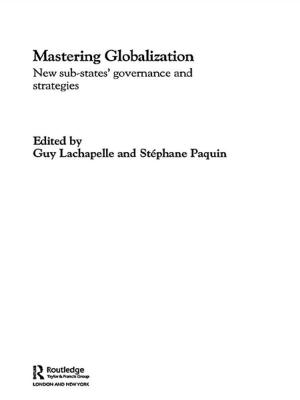Foucault, Buddhism and Disciplinary Rules
Nonfiction, Religion & Spirituality, Eastern Religions, Buddhism| Author: | Malcolm Voyce | ISBN: | 9781317133773 |
| Publisher: | Taylor and Francis | Publication: | December 1, 2016 |
| Imprint: | Routledge | Language: | English |
| Author: | Malcolm Voyce |
| ISBN: | 9781317133773 |
| Publisher: | Taylor and Francis |
| Publication: | December 1, 2016 |
| Imprint: | Routledge |
| Language: | English |
This book suggests that previous critiques of the rules of Buddhist monks (Vinaya) may now be reconsidered in order to deal with some of the assumptions concerning the legal nature of these rules and to provide a focus on how Vinaya texts may have actually operated in practice. Malcolm Voyce utilizes the work of Foucault and his notions of 'power' and 'subjectivity' in three ways. First, he examines The Buddha's role as a lawmaker to show how Buddhist texts were a form of lawmaking that had a diffused and lateral conception of authority. While lawmakers in some religious groups may be seen as authoritative, in the sense that leaders or founders were coercive or charismatic, the Buddhist concept of authority allows for a degree of freedom for the individual to shape or form themselves. Second, he shows that the confession ritual acted as a disciplinary measure to develop a unique sense of collective governance based on self regulation, self-governance and self-discipline. Third, he argues that while the Vinaya has been seen by some as a code or form of regulation that required obedience, the Vinaya had a double nature in that its rules could be transgressed and that offenders could be dealt with appropriately in particular situations. Voyce shows that the Vinaya was not an independent legal system, but that it was dependent on the Dharmaśāstra for some of its jurisprudential needs, and that it was not a form of customary law in the strict sense, but a wider system of jurisprudence linked to Dharmaśāstra principles and precepts.
This book suggests that previous critiques of the rules of Buddhist monks (Vinaya) may now be reconsidered in order to deal with some of the assumptions concerning the legal nature of these rules and to provide a focus on how Vinaya texts may have actually operated in practice. Malcolm Voyce utilizes the work of Foucault and his notions of 'power' and 'subjectivity' in three ways. First, he examines The Buddha's role as a lawmaker to show how Buddhist texts were a form of lawmaking that had a diffused and lateral conception of authority. While lawmakers in some religious groups may be seen as authoritative, in the sense that leaders or founders were coercive or charismatic, the Buddhist concept of authority allows for a degree of freedom for the individual to shape or form themselves. Second, he shows that the confession ritual acted as a disciplinary measure to develop a unique sense of collective governance based on self regulation, self-governance and self-discipline. Third, he argues that while the Vinaya has been seen by some as a code or form of regulation that required obedience, the Vinaya had a double nature in that its rules could be transgressed and that offenders could be dealt with appropriately in particular situations. Voyce shows that the Vinaya was not an independent legal system, but that it was dependent on the Dharmaśāstra for some of its jurisprudential needs, and that it was not a form of customary law in the strict sense, but a wider system of jurisprudence linked to Dharmaśāstra principles and precepts.















